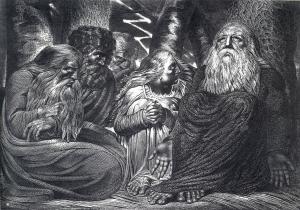 Anyone who speaks two or more languages knows all too well that all translations from one language to another are only interpretations, and necessarily complex and oft times disputed ones at that. This is true even when those languages are modern, living ones, where the nuanced meanings of the words can be evaluated by native speakers of those languages. How much more difficult is it when one or more of those languages are dead, not having been spoken for millennia? So it is with Hebrew, a language for all intents and purposes unspoken for more than two thousand years. Of course, modern Israeli is a language that is loosely based on classical Hebrew, but it has been heavily influenced by numerous modern tongues spoken by its many citizens who represent a polyglot of Middle-Eastern, European, and English tongues.
Anyone who speaks two or more languages knows all too well that all translations from one language to another are only interpretations, and necessarily complex and oft times disputed ones at that. This is true even when those languages are modern, living ones, where the nuanced meanings of the words can be evaluated by native speakers of those languages. How much more difficult is it when one or more of those languages are dead, not having been spoken for millennia? So it is with Hebrew, a language for all intents and purposes unspoken for more than two thousand years. Of course, modern Israeli is a language that is loosely based on classical Hebrew, but it has been heavily influenced by numerous modern tongues spoken by its many citizens who represent a polyglot of Middle-Eastern, European, and English tongues.
These difficulties of translation are equally evident among those of us who have been privileged to study the Hebrew language, and several of its cognate languages, over a lifetime. Of course, there are various levels of difficulty when a reader confronts classical Hebrew. After perhaps a year or two of basic Hebrew study, a student may successfully read the book of Deuteronomy with its simple syntax and constant repetition of words. And several examples of prose may also be navigated like portions of Genesis or Exodus, along with the story of Ruth or Jonah, excepting perhaps the poem of chapter 2. It takes considerably more skill to move through the Psalms or other poetic material, and the prose of the books of Genesis and Samuel can be difficult at times. But surely the pinnacle of classical Hebrew is the book of Job. It is nothing less than a viper’s nest of complexities with its more than 200 words unique to this book, and its near-constant grammatical conundra that are found in every chapter. To be able to move through the Hebrew of Job, one needs much patience along with a firm grasp of the myriad possibilities of Hebrew syntax. Job is not for the faint of heart or for the Hebrew novice.
Today’s lectionary text, the final chapter of Job’s long tale, presents the reader with a classical place where possible translation is both crucial and well nigh impossible. Of course, a reader of an English Bible would hardly know that the crucial verses 42:1-6 fairly bristle with grammatical traps and linguistic confusions. The NRSV, for example, offers its readers not a single footnote to suggest that its own translation is far from certain and could be judged almost spurious. In this brief essay, I plan to look at only one verse as an example of the difficulties of translation to suggest that the way one goes at this particular text will determine in large measure just what a reader may conclude about the ultimate meaning of the entire story!
That verse is 42:6. Here is what the NRSV reads: “therefore I despise myself, and repent in dust and ashes.” With that translation we are to conclude, I assume, that Job’s confrontation with YHWH has lead him to examine himself, to decide that he is finally despicable (due to the terrible ways he has spoken about God in the dialogue? Or because he has actually seen God and feels moved to self-abnegation?) and then is forced to “repent in dust and ashes,” presumably acting as a penitent at the mourner’s bench, confessing both his unworthiness and his abject contrition in the face of God’s barrage of questions. Thus the tale ends with a repentant Job, cowed by the might and awe of his God, ready to be received back into God’s good graces. In short, in this reading Job finally does precisely what his friends have urged him to do throughout the dialogue, namely repent of something he has done wrong (?) and be welcomed back by God. What that wrong may be is hardly clear (his Augustinian original sin?), making his “repentance” somewhat peculiar and hard to fathom.
But what if the verse is read rather like this? “So I submit, and I accept consolation for my dust and ashes.” This is David Clines’s reading in his massive commentary of 2011. This seems a world away from the translation of the NRSV. Far from “despising himself,” Job is said to “submit,” that is to give up his long court case with YHWH, and instead of continuing his contentious struggle with YHWH, he receives “consolation” from that same YHWH “for his dust and ashes,” that is for his mourning which has been constant since the death of his children in the prologue. He ceases his mourning, he withdraws his indictment of YHWH’s apparent lack of justice, and he returns to his farming life, as the rest of the epilogue (vss.7-17) make plain.
I admit to finding this reading both anticlimactic and unsatisfying. Here is my own reading of the verse: “Therefore, I retract, and change my mind on dust and ashes.” Job’s ultimate confrontation with YHWH in one sense teaches him nothing basically new about his God; he has throughout the dialogue known that God was far stronger than he (see 9:13-20), and that God, if ever God showed up, would not really engage Job in genuine dialogue, but would bluster and blow and pay no attention to his demands for justice. And so God has done in those grand speeches. Job thus “retracts” his case, because he knows now for certain, or thinks he knows, that YHWH cares little for Job’s justice. Thus, Job “changes his mind” (a common reading of the verb here—see Ex.32:14 for a classic divine case of mind changing), that is he decides to give in to the superior might of YHWH. He after all is only a human being, only a creature of “dust and ashes.” And so he will remain.
But there is rich irony here. Job concludes from his meeting with YHWH that YHWH’s disinterest in Job’s justice is a sign that YHWH cares little for human individuals and their small quest for justice in their lives. But I conclude that Job has in fact missed the full import of what YHWH has revealed to him in those wonderful speeches. Job has been so fixed on his own desire for justice that he has completely misheard what YHWH has shown him. What Job has missed, and what many of us miss, too, is that YHWH is primarily concerned with all things, all creatures, all actions of the weather, all wild animals and their care. We care only for ourselves, as does Job, while YHWH is feeding and watering and caring for the daily workings of the cosmos. We humans do not stand in the center of that cosmos, as we so often think we do, as Job certainly thought he did. We are a part of what YHWH cares for, but hardly the only part, and quite regularly not often the most important part. YHWH asks Job, and us, to move ourselves off the center of things and to consider more carefully the mountain goat and the ostrich, the raven and the lion, the snow and the wind. It is not always about us, says YHWH, and unless we can hear that word, we are doomed to continue our exploitation of the planet and our abuse of one another who live on it.
You can easily see just how crucial translation is in assessing what the marvelous author of Job was about in this astonishing story. Finally, no one can be absolutely certain exactly what that ancient worthy was pointing to in his amazing poem. But I am certain that probing into the mind of YHWH was a uniquely valuable addition to the religious literature of Israel, and that too often we have overlooked that work, simplified it to fit our preconceived scheme, and thereby failed to be enriched and challenged afresh as the writer surely intended. I urge you to allow this great book to work on your own heart and mind as you probe the fullness of our unfathomable God.
(Images from Wikimedia Commons)











